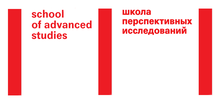School of Advanced Studies
School of Advanced Studies (SAS) (Школа перспективных исследований in Russian) is a greenfield liberal arts and sciences institution at the University of Tyumen, Siberia, Russia, focusing on both teaching and multidisciplinary research.
Школа перспективных исследований | |
 | |
| Type | Public, honors college, liberal arts and sciences college |
|---|---|
| Established | 2017 |
| Director | Andrey Shcherbenok |
Academic staff | 25 full-time professors |
| Students | 185 |
| Undergraduates | 155 |
| Postgraduates | 30 |
| Address | 8 Marta St, 2k1 , , |
| Website | https://sas.utmn.ru/en/ |
The School was established in September 2017, with a liberal arts college model as its basis. The School is the second of its kind in Russia, after the Smolny College. SAS was developed in the framework of the University of Tyumen’s strategy within the 5-100 Project. The School combines three major fields of study: social sciences, arts and humanities, and life sciences. The BA and MA programs offered by SAS are in English, though some courses are also available in Russian.
Academics
SAS faculty are a combination of full-time professors and visiting professors. Full-time professors are on a three year contract. They are paid a subsistence level base salary. The remaining 80% of their salary is made up of performance bonuses which are automatically removed if they fail the annual external peer review.
Undergraduate education
In terms of the undergraduate education model, SAS is an honors college within the University of Tyumen.[1]
During the first two years, students follow the core curriculum and also take elective courses. Afterwards, students declare one of the seven majors: Information Technology and Digital Society, Cultural Studies, Life Sciences, Economics, Film and Media Studies, Historical Studies, and Sociology and Anthropology. Additionally, students complete one of the minors.[2]
Graduate education
Currently, SAS is running one professional Master’s program: Master of Arts in Digital Cultures and Media Production, with the other one, Master of Arts in Experimental Higher Education, to be launched in the Fall of 2020.
Research
SAS research is carried out in multidisciplinary research teams. In 2020, there were five research teams operating within SAS.[3]
Tuition
SAS offers a combination of state-funded, university-funded, and places with a tuition fee. Additionally, the best students according to the academic rating, receive scholarships.
Academic calendar
The academic year at SAS is divided into four quarters.[4]
Faculty hiring model
Faculty are selected via the Project Design Session cluster hiring process, based on how they perform in multidisciplinary teamwork exercises.
Outreach
During the academic year, SAS offers open courses twice a week, which are free for the public to attend, are recorded and published on the School’s youtube channel.[5] Every summer, SAS runs a summer school for high-school students.[6]
Network memberships
SAS is a member of the Consortium of Humanities Centers and Institutes, which currently has a membership of over 250 organisations around the world.
Building
SAS has a separate building, renovated in 2017. Apart from the School itself, there is a nonfiction bookstore and a café in the building.
Controversy
SAS has been described as an "academic sweatshop" and an "abusive institution" by a former faculty member who canvassed the opinions of her colleagues and students for an article in openDemocracy. This article has been widely discussed in academic circles within Russia and beyond. In these discussions SAS has been criticised for not being open about the fact that it is run by faculty from Skolkovo Management School in Moscow, according to principles devised by soviet-era management guru Georgi Shchedrovitsky. Skolkovo Management School is involved in training university and corporate management teams according to Shchedrovitsky methodology throughout Russia and has influence in the highest levels of Russian government. It is known for being secretive about the content of these trainings and about the extent of their influence in Russia. It is said on the Carnegie Moscow Center website that "Shchedrovitsky essentially viewed human beings as machines that must be programed to perform certain functions—essentially, the theory of “social engineering.” SAS has fought back against its critics with articles such as one written by a temporary adjunct teacher brought in to cover a teacher-shortage caused by the school's draconian measures against its faculty, 50% of whom left before the end of their contracts during the first two years of the school's existence. The article was published in a blog edited by the school's Director of Education who was responsible for hiring its author. Current faculty are contractually prevented from saying anything negative about SAS, and the majority have chosen to remain silent about the situation there during these controversies.
References
- within the University of Tyumen.
- "Education » School of advanced studies". Retrieved 2020-03-16.
- "Research Projects » School of advanced studies". Retrieved 2020-03-16.
- "Academic Calendar » School of advanced studies". Retrieved 2020-03-16.
- youtube channel
- "Summer School » School of advanced studies". Retrieved 2020-03-16.
External links
- Official website
- SAS YouTube Channel
- How 'love what you do' went wrong in an ‘academic sweatshop’ in Siberia
- Sergei Kiriyenko: The Dreamer in the Kremlin
- SKOLKOVO project method